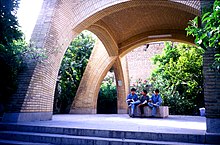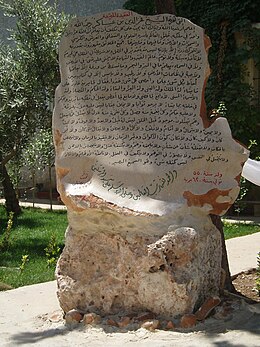
The Chishti order is a Sufi order of Sunni Islam named after the town of Chisht where it was initiated by Abu Ishaq Shami. The order was brought to South Asia by Mu'in al-Din Chishti in the city of Ajmer.

Mu'in al-Din Hasan Chishti Sijzi, known reverentially as Khawaja Gharib Nawaz, was a Persian Islamic scholar and mystic from Sistan, who eventually ended up settling in the Indian subcontinent in the early 13th-century, where he promulgated the Chishtiyya order of Sunni mysticism. This particular Tariqa (order) became the dominant Islamic spiritual order in medieval India. Most of the Indian Sunni saints are Chishti in their affiliation, including Nizamuddin Awliya and Amir Khusrow.

A dargah is a shrine or tomb built over the grave of a revered religious figure, often a Sufi saint or dervish. Sufis often visit the shrine for ziyarat, a term associated with religious visitation and pilgrimages. Dargahs are often associated with Sufi eating and meeting rooms and hostels, called khanqah or hospices. They usually include a mosque, meeting rooms, Islamic religious schools (madrassas), residences for a teacher or caretaker, hospitals, and other buildings for community purposes.
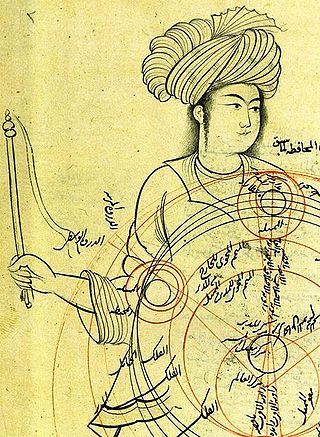
Qotb al-Din Mahmoud b. Zia al-Din Mas'ud b. Mosleh Shirazi was a 13th-century Persian polymath and poet who made contributions to astronomy, mathematics, medicine, physics, music theory, philosophy and Sufism.
Muhammad ibn Thalib ibn Abd Allah ibn Ni`mat Allah ibn Sadr ad-Din ibn Shaykh Baha' ad-Din ash-Shirazi was a 15th-century Persian physician from Shiraz, Iran.

Abu al-Hasan al-Shadhili also known as Sheikh al-Shadhili was an influential Moroccan Islamic scholar and Sufi, founder of the Shadhili Sufi order.

The Suhrawardi order is a Sufi order founded by Abu ’l-Nad̲j̲īb Suhrawardī. Lacking a centralised structure, it eventually divided into various branches. The order was especially prominent in India. The ideology of the Suhrawardi order was inspired by Junayd of Baghdad, a Persian scholar and mystic from Baghdad.

Abu Ismaïl Abdullah al-Harawi al-Ansari or Abdullah Ansari of Herat (1006–1088) also known as Pir-i Herat "Sage of Herat", was a Sufi saint, who lived in Herat. Ansari was a commentator on the Qur'an, scholar of the Hanbali school of thought (madhhab), traditionalist, polemicist and spiritual master, known for his oratory and poetic talents in Arabic and Persian.

Tāj al-Dīn Abū'l-Faḍl Aḥmad ibn Muḥammad ibn ʿAbd al-Karīm ibn Abd al-Rahman ibn Abdullah ibn Ahmad ibn Isa ibn Hussein ibn ʿAṭā Allāh al-Judhami al-Iskandarī al-Shādhilī was an Egyptian Malikite jurist, muhaddith and the third murshid of the Shadhili Sufi order.

Saadi Shīrāzī, better known by his pen name Saadi, also known as Sadi of Shiraz, was a Persian poet and prose writer of the medieval period. He is recognized for the quality of his writings and for the depth of his social and moral thoughts.
Al-Mu'ayyad fid-din Abu Nasr Hibat Allah b. Abi 'Imran Musa b. Da'ud ash-Shirazi was an 11th-century Isma'ili scholar, philosopher-poet, preacher and theologian of Persian origin. He served the Fatimid Caliph-Imām al-Mustansir Billah as a Da'i in varying capacities, eventually attaining the highest rank of Bab al-Abwab "The Gate of Gates" and Da'i al-du'at "Chief Missionary" in the Fatimid Da‘wah. In his theological and philosophical writings he brought the Isma'ili spiritual heritage to its pinnacle.
Ibn Abbad al-Rundi (1333–1390) was one of the leading Sufi theologians of his time who was born in Ronda. Attracted to Morocco by the famous madrasahs, Ibn Abbad emigrated there at an early age. He spent most of his life in Morocco, living in different cities, and was buried in Bab al-Futuh cemetery in Fes.
Abu Muhammad Ruwaym bin Ahmad was an early Muslim jurist, ascetic, saint and reciter of the Qur'an. He was one of the second generation of practitioners of Sufism (tasawwuf).
Nasrallah ibn Muhammad ibn Abd al-Hamid Shirazi, better known as Abu'l-Ma'ali Nasrallah, was a Persian poet and statesman who served as the vizier of the Ghaznavid Sultan Khusrau Malik.

Ahli Shirazi, full name Muhammad ibn Yusuf Ahli Shirazi, was a Persian poet who lived in Shiraz, Iran from 858 to 942H. He is buried in Hafezieh.

Islam uses a number of conventionally complimentary phrases wishing-well or praising religiously-esteemed figures including God (Allah), Muhammad, Muhammad's companions (sahaba), family, other Islamic prophets and messengers, angels, and revered persons. In Twelver Shi'ism, honorifics are used with the Twelve Imams.
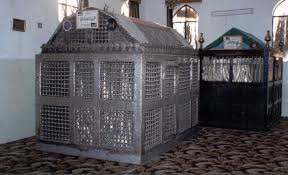
Sari ibn al-Mughallis al-Saqati (Persian: السري بن المغلس السقطي, romanized: Sarī ibn al-Mughallis al-Saqaṭī was one of the early Muslim Sufi saints of Baghdad. He was one of the most influential students of Maruf Karkhi and one of the first to present Sufism in a systematic way. He was also a friend of Bishr al-Hafi. He was the maternal uncle and spiritual master of Junayd of Baghdad.
'Ala' al-Din al-Bukhari, was a Hanafi jurist (faqih), Maturidi theologian, commentator of the Qur'an (mufassir), and a mystic (Sufi).
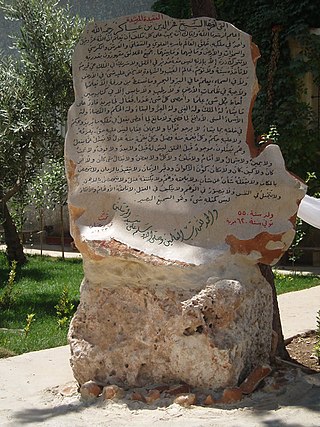
Abū Isḥāq Ibrāhīm ibn ʿAlī al-Shīrāzī was a prominent Persian jurisconsult, legal theoretician, theologian, debater and researcher. He was the foremost leading scholar of the Iraqi branch of the Shafiʿi school of law. He became the second teacher after succeeding Ibn al-Sabbagh at the Nizamiyya school in Baghdad, which was built in his honour by the vizier (minister) of the Seljuk Empire Nizam al-Mulk.
Abu al-Hasan al-Daylami was a Sufi author of Daylamite origin, who was based in Shiraz during the 10th century. His book ʿAtf al-alif al-ma'luf 'ala al-lam al-ma'tuf, albeit written in Arabic, is considered the first Persian Sufi text on the subject of divine love.
